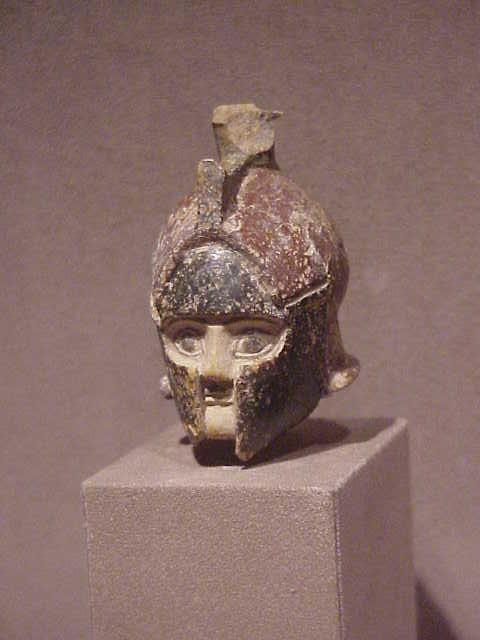.
Aryballos (perfume vessel) in the form of a Greek soldier 6th century BCE
"During the Archaic period in particular (although later examples are attested), wine, oil, or perfume containers were given the shape of a human head or more rarely of a human body part or a whole body. The presence of heads of divinities (such as Dionysos and satyrs), of heroes, such as Herakles, or of ordinary women and men reflected the vessel's content and function (Beazley 1929, 38-9).
This type of vase, which held perfumed oils, is called "plastic" because it was formed of soft clay using a mold. This example takes the shape of a helmeted warrior's head. The warrior is represented in his maturity, as the presence of a mustache suggests. His wide-open eyes stare out from under his head covering, the Ionian helmet. This type of helmet is not attested in any source other than numerous series of warrior-head vases. Its noteworthy characteristics are the metopon- the semicircular band over the forehead- the separately made cheekpieces, and the unprotected area of the nose (Hill 1961, 45; Ducat 1966, 27-8; Snodgrass 1967, 65-6; Biers 1984/5, 2-3).
Warrior head vases are of eastern Greek origin, possibly manufactured in Ephesus or Rhodes. The vessels were widely distributed in several areas of the Mediterranean (Ducat 1966, 26-7; Nicholls 1957, 304; Allentown 1979, 134, no. 64; Biers 1984/5, 5, n. 5). Their function is not known with certainty. Some scholars see them as ritual objects with funerary character- more specifically, as representations of deceased warriors; others posit that they were souvenirs (Maksimova 1927, 24; Hill 1961, 44; Ducat 1966, 28-9; Allentown 1979, 134, no. 64). Their widespread distribution suggests that they may have had different functions. An offering of this kind might emphasize the warrior qualities of the deceased, or it might imply the heroic character of his death." - Walters Art Museum
Walters Art Museum, Baltimore, Maryland USA


